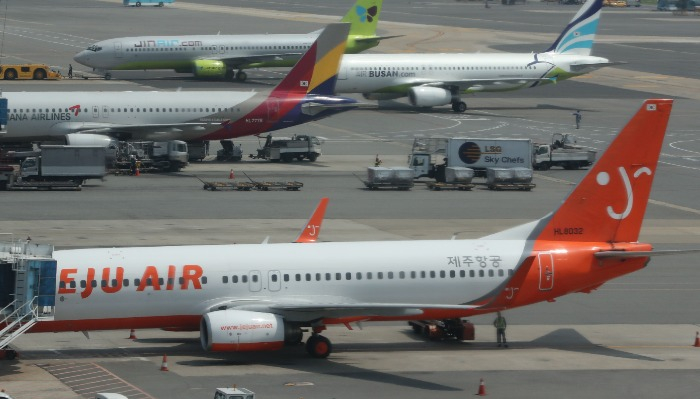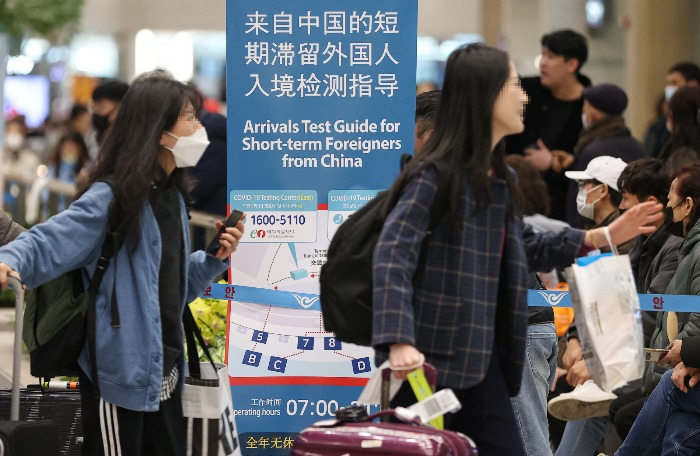Jeju Air CEO sees Korea-Indonesia routes as blue ocean
The airline shifts focus from crowded Korea-Japan routes and does not plan to launch long-haul flights
By May 23, 2023 (Gmt+09:00)
LG Chem to sell water filter business to Glenwood PE for $692 million


Kyobo Life poised to buy Japan’s SBI Group-owned savings bank


KT&G eyes overseas M&A after rejecting activist fund's offer


StockX in merger talks with Naver’s online reseller Kream


Mirae Asset to be named Korea Post’s core real estate fund operator



South Korea’s largest low-cost carrier (LCC) Jeju Air Co. will make the most of the post-pandemic recovery in travel demand by exploring Southeast Asian markets, primarily Indonesia, where it plans to open its first routes, its chief executive said on Tuesday.
Last week, Jeju Air launched one-off flights on two South Korea-Indonesia routes: Manado and Batam Island in Indonesia. The charter flights marked its first flight service from and to the Archipelago.
For the destination of the northeastern port city of Manado, it became the first Korean airplane serving the air route.
“Jeju Air will make all-out efforts to explore Southeast Asian markets such as Indonesia,” CEO Kim E-Bae said in a video interview with The Korea Economic Daily on Tuesday.
“Once we are assigned Indonesia routes, we will add four cities in Indonesia to our destinations … We will deploy new airplanes to the South Korea-Indonesia routes, where only full-service carriers currently fly.”
Next month, air routes between the two countries will be assigned to carriers.

Kim painted an upbeat picture for South Korea-Indonesia travel demand as many Korean companies transferred manufacturing lines from China to Indonesia and other parts of Southeast Asia.
“Indonesia, the world’s fourth most populous country, will become a new blue ocean. Hallyu, which sweeps the country, will create outbound travel demand (for South Korea),” he noted.
Hallyu, or the Korea wave, refers to K-pop and K-culture.
NO EXPANSION BEYOND ASIA
Thanks to the stellar results, they reinstated all their employees that were on furlough during the pandemic and recruited new workers.
Now some domestic LCCs such as Air Premia Co. and T’way Air Co. are seeking to launch long-haul flights to and from Europe and the US.
But CEO Kim shook his head at such a move.
“That’s not a good strategy at all. Low-cost carriers should compete in their target market, namely short flights,” he noted.
“Unlike some LCCs, we have no plan to operate large carriers (for long-haul flights).”
Instead, Jeju Air will buy or lease new 40 airplanes designed for short-haul routes to replace its existing planes and expand its fleet. The new models consume 15% less fuel than the existing ones and feature state-of-the-art equipment.

SOUTH KOREA-JAPAN ROUTES
He said the price competition for South Korea-Japan routes, the most lucrative ones for domestic nine LCCs, will heat up further.
He hopes Korean Air Co.’s proposed purchase of Asiana Airlines Inc. could shake up the domestic LCC market. But the deal is poised to collapse after the European Union raised a hurdle to the approval of their merger.
Jin Air belongs to Korean Air. Air Seoul and Air Busan are under Asiana’s wing.
Write to Jae-Fu Kim and Mi-Sun Kang at hu@hankyung.com
Yeonhee Kim edited this article.
-

-
 AirlinesS.Korea's leading low-cost carrier Jeju Air posts record-high Q1 results
AirlinesS.Korea's leading low-cost carrier Jeju Air posts record-high Q1 resultsMay 10, 2023 (Gmt+09:00)
2 Min read -
 AirlinesJeju Air resumes daily flights to Hanoi, Ho Chi Minh City, Vientiane
AirlinesJeju Air resumes daily flights to Hanoi, Ho Chi Minh City, VientianeFeb 07, 2023 (Gmt+09:00)
1 Min read -
 AirlinesJeju Air to resume flights on Incheon-Shizuoka route in March
AirlinesJeju Air to resume flights on Incheon-Shizuoka route in MarchFeb 03, 2023 (Gmt+09:00)
1 Min read -

-

-
 AirlinesJeju Air rules Korea-Japan routes to beat legacy carriers
AirlinesJeju Air rules Korea-Japan routes to beat legacy carriersDec 09, 2022 (Gmt+09:00)
2 Min read


